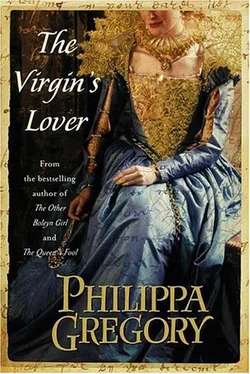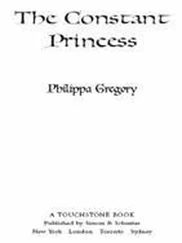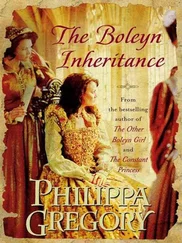1 ...5 6 7 9 10 11 ...109 Winter 1558–59
THE COURT ALWAYS HELD CHRISTMAS at Whitehall Palace, and Cecil and Elizabeth were anxious that the traditions of Tudor rule should be seen as continuous. The people should see that Elizabeth was a monarch just as Mary had been, just as Edward had been, just as their father had been: the glorious Henry VIII.
“I know there should be a Lord of Misrule,” Cecil said uncertainly. “And a Christmas masque, and there should be the king’s choristers, and a series of banquets.” He broke off. He had been a senior administrator to the Dudley family and thus served their masters the Tudors; but he had never been part of the inner circle of the Tudor court. He had been present at business meetings, reporting to the Dudley household, not at entertainments, and he had never taken part in any of the organization or planning of a great court.
“I last came to Edward’s court when he was sick,” Elizabeth said, worried. “There was no feasting or masquing then. And Mary’s court went to Mass three times a day, even in the Christmas season, and was terribly gloomy. They had one good Christmas, I think, when Philip first came over and she thought she was with child, but I was under house arrest then, I didn’t see what was done.”
“We shall have to make new traditions,” Cecil said, trying to cheer her.
“I don’t want new traditions,” she replied. “There has been too much change. People must see that things have been restored, that my court is as good as my father’s.”
Half a dozen household servants went past carrying a cartload of tapestries. One group turned in one direction, the others turned in the other, and the tapestries dropped between the six of them. They did not know where things were to go, the rooms had not been properly allocated. No one knew the rules of precedence in this new court; it was not yet established where the great lords would be housed. The traditional Catholic lords who had been in power under Queen Mary were staying away from the upstart princess; the Protestant arrivistes had not yet returned in their rush from foreign exile; the court officers, essential servants to run the great traveling business which was the royal court, were not yet commanded by an experienced Lord Chamberlain. It was all confused and new.
Robert Dudley stepped around the tumbled tapestries, strolled up and gave Elizabeth a smiling bow, doffing his scarlet cap with his usual flair. “Your Grace.”
“Sir Robert. You’re Master of Horse. Doesn’t that mean that you will take care of all the ceremonies and celebrations as well?”
“Of course,” he said easily. “I will bring you a list of entertainments that you might enjoy.”
She hesitated. “You have new ideas for entertainments?”
He shrugged, glancing at Cecil, as if he wondered what the question might mean. “I have some new ideas, Your Grace. You are a princess new-come to her throne, you might like some new celebrations. But the Christmas masque usually follows tradition. We usually have a Christmas banquet, and, if it is cold enough, an ice fair. I thought you might like a Russian masque, with bear baiting and savage dancing; and of course all the ambassadors will come to be presented, so we will need dinners and hunting parties and picnics to welcome them.”
Elizabeth was taken aback. “And you know how to do all this?”
He smiled, still not understanding. “Well, I know how to give the orders.”
Cecil had a sudden uncomfortable sense, very rare for him, of being out of his depth, faced with issues he did not understand. He felt poor, he felt provincial. He felt that he was his father’s son, a servant in the royal household, a profiteer from the sale of the monasteries, and a man who earned his fortune by marrying an heiress. The gulf between himself and Robert Dudley, always a great one, felt all at once wider. Robert Dudley’s grandfather had been a grandee at the court of Henry VII, his son the greatest man at the court of Henry VIII; he had been a kingmaker; he had even been, for six heady days, father-in-law to the Queen of England.
Young Robert Dudley had been running in and out of the halls of the royal palaces of England as his home, while Elizabeth had been in disgrace, alone in the country. Of the three of them it was Dudley who was most accustomed to power and position. Cecil glanced at the young queen and saw, mirrored in her face, his own uncertainty and sense of inadequacy.
“Robert, I don’t know how to do this,” she said in a small voice. “I can’t even remember how to get from the king’s rooms to the great hall. If someone doesn’t walk before me I’ll get lost. I don’t know how to get to the gardens from the picture gallery, or from the stable to my rooms, I…I’m lost here.”
Cecil saw, he could not be mistaken, the sudden leap of something in the younger man’s face—hope? ambition?—as Dudley realized why the young queen and her principal advisor were standing outside her premier London palace, looking almost as if they did not dare to go in.
Sweetly, he offered her his arm. “Your Majesty, let me welcome you to my old home, your new palace. These walks and these walls will be as familiar to you as Hatfield was, and you will be happier here than you have ever been before, I guarantee it. Everyone gets lost in Whitehall Palace; it is a village, not a house. Let me be your guide.”
It was generously and elegantly done, and Elizabeth’s face warmed. She took his arm and glanced back at Cecil.
“I will follow, Your Grace,” he said quickly, thinking that he could not bear to have Robert Dudley show him his own rooms as if he owned the place. Aye, Cecil thought. Go on, take your advantage. You just had the two of us at a loss. We stood here, the newcomers, not even knowing where our bedrooms are; and you know this place like the back of your hand. It’s as if you are more royal than her, as if you were the rightful prince here, and now, graciously enough, you show her round your home.
But it was not all as easy as Elizabeth learning her way round the corridors and back stairs of the warren that was Whitehall Palace. When they went out in the streets there were many who doffed their caps and cried hurrah for the Protestant princess, but there were many also who did not want another woman on the throne, seeing what the last one had done. Many would have preferred Elizabeth to declare her betrothal to a good Protestant prince and get a sensible man’s hand on the reins of England at once. There were many others who remarked that surely Lord Henry Hastings, nephew to King Henry, and married to Robert Dudley’s sister, had nearly as good a claim as Elizabeth, and he was an honorable young man and fit to rule. There were even more who whispered in secret or said nothing at all but who longed for the coming of Mary, Queen of Scots and Princess of France, who would bring peace to the kingdom, a lasting alliance with France, and an end to religious change. She was younger than Elizabeth, for sure, a sixteen-year-old girl but a real little beauty, and married to the heir to the French throne with all that power behind her.
Elizabeth, new-come to her throne, not yet crowned or anointed, had to find her way round her palace, had to put her friends in high places and that quickly, had to act like a confident Tudor heir, and had somehow to deal at once with her church which was in open and determined opposition to her and which would, unless it was swiftly controlled, bring her down.
There had to be a compromise and the Privy Council, still staffed with Mary’s advisors but leavened by Elizabeth’s new friends, came up with it. The church was to be restored to the condition in which Henry VIII had left it at the time of his death. An English church, commanded by Englishmen and headed by the monarch, that obeyed English laws and paid its tithes into the English treasury, where the litany, homilies, and prayers were often read in English; but where the shape and content of the service were all but identical to the Catholic Mass.
Читать дальше
Конец ознакомительного отрывка
Купить книгу












